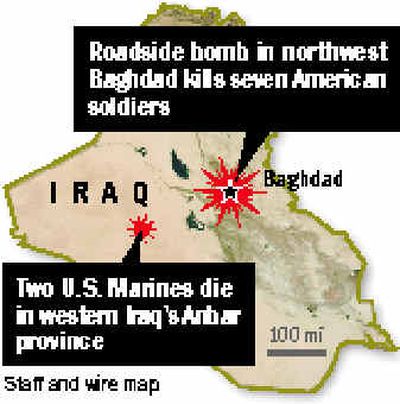9 U.S. troops die

BAGHDAD, Iraq – A roadside bomb killed seven U.S. soldiers in northwest Baghdad and two Marines were killed in western Iraq on Thursday, the deadliest day for American forces since a suicide attack on a U.S. base last month.
The bombing came as Iraq extended a state of emergency by 30 days to battle militants whose attacks have surged ahead of this month’s elections. The prime minister warned the number of assaults would only rise as voting day draws closer.
Just three weeks before the Jan. 30 elections, the commander of U.S. ground forces in Iraq acknowledged that security is poor in four of 18 Iraqi provinces. But Lt. Gen. Thomas Metz told a briefing in the capital that delaying the vote would only increase the danger.
“I can’t guarantee that every person in Iraq that wants to vote, goes to a polling booth and can do that safely,” Metz said. “We’re going to do everything possible to create that condition for them, but we are fighting an enemy who cares less who he kills, when he kills and how he kills. A delay in the elections just gives the thugs and terrorists more time to continue their intimidation, their cruelty, their brutal murders of innocent people.”
The soldiers with Task Force Baghdad were on patrol Thursday evening when their Bradley fighting vehicle hit the explosive, the military said in a statement. Everyone inside the Bradley was killed.
No other details were immediately available about the latest attack. But Iraq’s insurgents have frequently targeted American troops with crude explosives planted in roads and detonated remotely as patrols pass.
The two other U.S. Marines killed in action Thursday were both members of the 1st Marine Expeditionary Force and lost their lives in Anbar province, which is home to the volatile city of Fallujah.
The previous four days had seen a string of assassinations, suicide car bombings and other assaults that killed 90 people.
On Tuesday, five American troops were killed, including three Task Force Baghdad soldiers who died in a roadside bombing, one who was slain in Anbar, and another who died in Balad, north of Baghdad.
But Thursday’s toll was the highest for the U.S. military in Iraq since a suicide bombing at a mess tent in Mosul on Dec. 21 killed 22 people, including 14 U.S. soldiers and three American contractors.
The latest deaths brought the number of U.S. troops killed since the beginning of the Iraq war in March 2003 to 1,350, according to an Associated Press count. At least 1,063 died as a result of hostile action.
The military said the names of the troops who died Thursday were being withheld until their families are notified.
As militants continued with the attacks, Iraqi authorities made some grisly discoveries. Police in the southern city of Basra found two charred and beheaded bodies in a house used by election officials. Police also announced they found the bodies of 18 young Shiites killed last month while seeking work at a U.S. base.
The state of emergency, originally announced two months ago, was extended for 30 days throughout the country except for the northern Kurdish-run areas, a government statement said. The decree includes a nighttime curfew and gives the government additional power to make arrests and launch military or police operations.
Interim Prime Minister Ayad Allawi said he expected the number of attacks would rise before the Jan. 30 vote and called the decision on prolonging the state of emergency a precaution. He blamed former members of Saddam Hussein’s regime for the continuing violence.
Allawi, a secular Shiite, is insisting the elections go forward, despite calls from some Sunni religious leaders for a boycott. Sunni Arab political parties have largely withdrawn from the race because of security fears, particularly in western Iraq. Some have sought a delay of the vote.
The United States strongly opposes a postponement. Metz acknowledged U.S. forces “continue to deal with violence and lawlessness in some areas,” specifically citing Nineveh, Anbar, Salahadin and Baghdad provinces. But he said other areas were secure enough to allow the elections to go ahead.